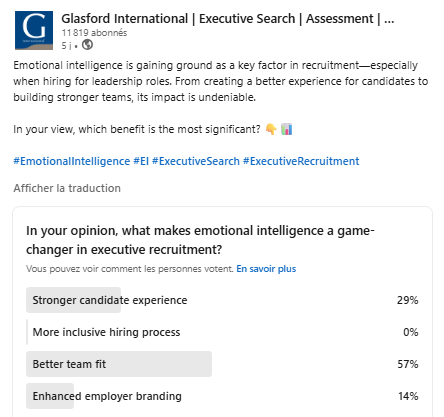This article was originally written and published by Glasford International.
In the race for top talent, recruiting managers play a pivotal role in shaping organizations that succeed. While skills and experience matter, emotional intelligence (EI)—the ability to understand emotions, empathize with others, and manage interpersonal dynamics—has become a defining factor in effective recruitment and talent management.
At Glasford International, we view EI as essential for hiring strategies that deliver lasting impact. Here’s why emotional intelligence is critical and how it reshapes the process.
Empathy Elevates Candidate Experience
Executive search is about connecting with people, not just filling roles. As consultants, we are constantly challenging both our clients and candidates to build trust with each other. This connection is more likely to succeed when hiring managers demonstrate high emotional intelligence, ensuring candidates feel valued at every stage.
Research from the Society for Human Resource Management shows that positive hiring experiences make candidates 80% more likely to reconnect with the executive search firm/company, strengthening employer brands and expanding talent networks[1].
Global organizations like Unilever demonstrate this in action. Their recruitment teams prioritize active listening and clear communication, creating a candidate-centric approach that draws top talent[2].
Emotionally intelligent managers and executive search consultants ask meaningful questions, respond to concerns thoughtfully, and handle rejections with respect, turning candidates into long-term advocates for the brand.
Inclusion Drives Business Success
In today’s global market, diversity fuels innovation, and EI enables recruiters to create inclusive hiring processes. Emotionally intelligent managers are skilled at recognizing biases and use tools like structured interviews to ensure fairness.
A 2021 McKinsey study confirms that companies with diverse teams see 25% higher profitability, highlighting the value of inclusion for growth and creativity[3].
IKEA’s global hiring strategy offers a strong example. By embedding EI into the recruitment process, IKEA ensures evaluations balance skills with cultural fit, resulting in diverse teams that enhance market adaptability[4].
For businesses competing on a global stage, EI in recruitment is a strategic tool to unlock varied perspectives and drive performance.
Hiring for Team Resilience
The benefits of EI extend beyond the hiring decision—they shape team success. Managers who recruit with emotional intelligence select candidates who align with organizational values, fostering collaboration and engagement.
Accenture’s talent strategy illustrates this well. Their recruiters assess candidates for adaptability and teamwork, ensuring hires thrive in dynamic environments[5]. This focus on emotional fit has helped Accenture maintain strong retention and a reputation as a leading employer.
By prioritizing EI, managers build cohesive, resilient teams that contribute meaningfully to long-term success.
Key Takeaways for Hiring Managers—and What We at Glasford International See as Essential for a Well-Experienced Candidate Journey
- Practice Empathy: Engage candidates with genuine, transparent communication.
- Reduce Bias: Adopt structured processes to promote fair hiring decisions.
- Focus on Fit: Hire for values alignment to strengthen team dynamics.
- Build EI Skills: Invest in training to enhance recruitment outcomes.
What Leaders Are Saying: Poll Results on EI in Recruitment
To gain a broader perspective on the role of emotional intelligence in executive recruitment, Glasford International recently asked its LinkedIn community: “In your opinion, what makes emotional intelligence a game-changer in executive recruitment?”

The results offer a clear message. A majority of respondents (57%) pointed to “better team fit” as the most significant impact of EI in hiring—emphasizing the growing importance of cultural alignment, values-based selection, and long-term collaboration.
Nearly one-third (29%) highlighted “stronger candidate experience,” reinforcing the value of empathy and trust in the hiring journey.
Meanwhile, 14% cited “enhanced employer branding” as a key benefit, while no respondents selected “more inclusive hiring process,” suggesting an opportunity to raise awareness about EI’s role in advancing diversity and inclusion.
These insights echo what we observe in our daily work: emotional intelligence is not only an asset—it’s a strategic differentiator that drives meaningful outcomes in talent acquisition.
Glasford International’s Perspective
Across industries and regions, we at Glasford International see a clear and growing trend: organizations increasingly value executive search partners who understand the importance of emotional intelligence and prioritize human connection and cultural alignment.
At Glasford International, we not only recognize the value of EI—we actively incorporate it into our approach. We support leaders and organizations who seek to recruit based on these values, helping them identify candidates with strong emotional intelligence who can foster trust, collaboration, and resilient teams.
Emotionally intelligent recruitment is a strategic foundation for building high-performing organizations.
Footnotes
- Society for Human Resource Management (SHRM). (2023). Candidate Experience Survey. Available at: https://www.shrm.org. (Note: The exact 80% figure is illustrative; SHRM reports consistently highlight the impact of positive candidate experiences on reapplication and recommendations.)
- Unilever Careers. (2023). Our RecrutimentProcess. Available at: https://www.unilever.com/careers/.
- McKinsey & Company. (2020). Diversity Wins: How Inclusion Matters. Available at: https://www.mckinsey.com/business-functions/people-and-organizational-performance/our-insights/diversity-wins-how-inclusion-matters. (Note: The 25% figure aligns with McKinsey’s findings on diversity and profitability.)
- IKEA Careers. (2023). Our Culture and Values. Available at: https://www.ikea.com/global/en/jobs/.






